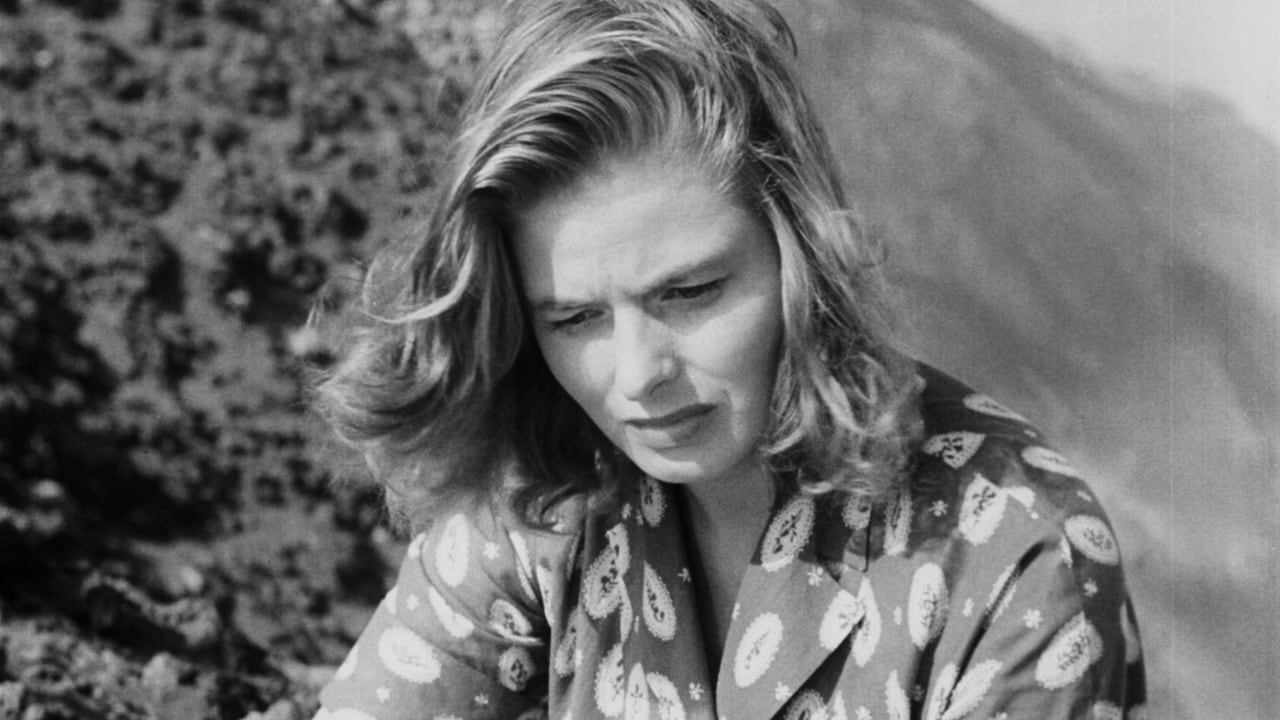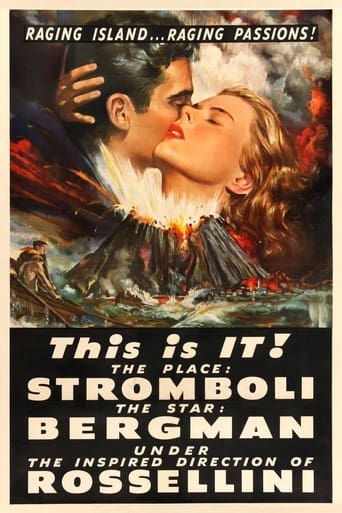

Better Late Then Never
... View MoreThere is just so much movie here. For some it may be too much. But in the same secretly sarcastic way most telemarketers say the phrase, the title of this one is particularly apt.
... View MoreAfter playing with our expectations, this turns out to be a very different sort of film.
... View MoreIt's easily one of the freshest, sharpest and most enjoyable films of this year.
... View MoreWhile Ingrid Bergman was in Europe shooting Under Capricorn for Alfred Hitchcock, she had a meeting with Italian director Robert Rosellini which would dramatically change her life and lead to one of the major film scandals of the 20th Century. She and Rosellini began an affair which resulted in her pregnancy which stars did not go public with back in those days. Especially if they were already married. It led to her Hollywood exile. But all that came after she agreed to leave Hollywood and star in Rosellini's new film Stromboli.The financing of the film according to the Citadel Film series book the Films of Ingrid Bergman was from Howard Hughes. And RKO Studios released it here in the USA. According to Rosellini American censors butchered the film and he disowned the American product. It got mixed reviews over here, a lot of that due to Ingrid's indiscretions. It is fascinating how stars get bound to an image. No one who played saints and nuns on the screen could be involved in anything as sordid as an illicit affair resulting in a pregnancy. Our puritanical selves exiled here for years, she would not do another American production until her second Oscar film Anastasia.Watching Stromboli today I have to say that the story did not make Ingrid a sympathetic figure in the film. She's a displaced refugee after World War II and marries an Italian soldier discharged who takes her to his home on a Mediterranean volcanic island named Stromboli. The people there make their living as fishermen and Bergman who has some education feels totally out of place. She can't make any friends there save for a lighthouse keeper Mario Sponza. That friend her husband Mario Vitale doesn't like and he beats her when he suspects an affair.Even after Bergman discovers she's pregnant she still wants to leave Stromboli bad. In a scene that I can't believe got by the censors she's even trying to seduce the village priest who offers her pious platitudes and nothing more.Looming over all is the volcano and these people who know any minute that the volcano could destroy them all, just live and accept where they are. Someone who wants to get out as bad as Bergman does, simply doesn't compute in their lives.Best scenes of all with the realism that Rosellini made his stock and trade are the scenes fishing and the volcano activities. Fishing was truly a group activity as you'll see and the volcano is up close and personal.I could never sympathize with Bergman's character so hence I could not really get into the story of Stromboli. Considering the alternatives that Bergman might have had, she was lucky to be there. There were in fact clear holes in the story, a product of bad editing.Still without a strong leading man, Bergman made Stromboli a most personal vehicle for herself. But overall the film was not strong in and of itself.
... View MoreI must confess that I don't belong to those who consider this movie a big masterpiece. The main problem is Ingrid Bergman and her role. Somehow I found it hard to believe that a woman who seems to be reasonably urbane and worldly-wise, or at least streetwise, and who seems to have weathered difficult situations during a World War in comparative comfort would follow an illiterate peasant to a dead end island. She has many scenes on her own in which she I can't describe it differently throws tantrums and feels sorry for herself. It just becomes a boring routine after a while and a little ridiculous as well. There is no character development whatsoever. I liked Bergman much more in movies like Notorious or Gaslight were she probably received better direction.However, the fantastic locations more than compensate for those flaws. The island of Stromboli is nothing more than an active volcano. The main characters live on the edge between the sea and the towering crater. All important movements in this movie are vertical. The messages from hell fall out of the sky in the form of burning rocks or lower themselves over the heads of people as poisonous gases. A contrary movement up from the bottom - is the awesome fishing expedition for me the most unforgettable event of the movie. Large teams of fishermen haul in a huge net, singing. Gradually the surface of the water over the net starts getting agitated until at last huge fish (tuna, I guess) start emerging in a wild frenzy and are hauled aboard. This is perfectly filmed an edited and simply horrific.All the elements come together and leave little action space for the cornered humans. The movie proposes two solutions: emigration or religion. The priest of the island plays a pivotal role in the story as he represents the link between the two options. However his actions seemed to me pretty inconclusive, at first he expresses himself overly optimistic, in an almost derisory way, as to the functionality of the ill fitted marriage of the heroine, then he declares himself incapable of helping the heroine, throwing her back onto herself in matters of religious belief. Eventually he comes through as the chief guardian of the dead buried on the island that is a kind of gateway to the world beyond. This is all interesting stuff, but it is not handled with particular care or discipline, which is a pity.
... View MoreThis film was a very controversial in 1950, mainly because of Ingrid Bergman's personal life which was talked about from every pulpit in the country and was actually banned by the Catholic Church. However, in today's standard of living, this would not have made much difference, we hear about such things going on in Hollywood all the time. Ingrid Bergman,(Karin), " Cactus Flower",'69, played a very frustrated young gal who tried to escape from one place and married a fisherman and witnessed a horrible smelly fishy scene with large tuna being hauled into small fishing boats. Karin also had the experience of having to go out into the sea in order to avoid being burned up by a volcano that was pouring down lava into her town. Poor Karin also gets locked up in her own home and starts flirting with a local man to help her escape. Karin winds up climbing up a huge mountain without a suitcase and only the clothes on her back. Ingrid Bergman gave an outstanding performance that will be long remembered. Great Film to view in Black & White.
... View MoreHaving spent a recent holiday on the Aeolian Islands this was a film I was very eager to see. I wasn't disappointed as I thought it was great. The film looks a little dated now though but in the early fifties would have been very good. If this film was made today there is no doubt today's special effects would certainly enhance the volcanic eruption scenes no end. The Tuna fishing scene was also very interesting but not for those of a squeamish disposition. The acting was first rate from both Ingrid Bergman and Mario Vitale. I was particularly interested in seeing this film after seeing the house on the island where Roberto Rossellini and Ingrid Bergman had stayed whilst this film was being made. A plaque on the property bears witness to this. All in all a very good film that I would recommend to anyone.
... View More